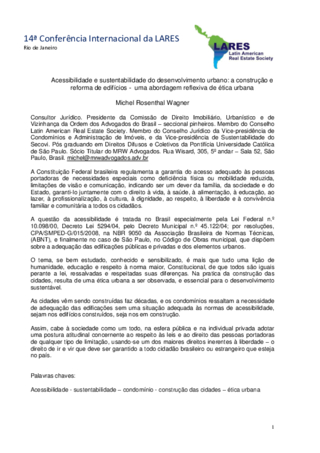A Constituição Federal brasileira regulamenta a garantia do acesso adequado às pessoas portadoras de necessidades especiais como deficiência física ou mobilidade reduzida, limitações de visão e comunicação, indicando ser um dever da família, da sociedade e do Estado, garanti-lo juntamente com o direito à vida, à saúde, à alimentação, à educação, ao lazer, à profissionalização, à cultura, à dignidade, ao respeito, à liberdade e à convivência familiar e comunitária a todos os cidadãos.
A questão da acessibilidade é tratada no Brasil especialmente pela Lei Federal n.o 10.098/00, Decreto Lei 5294/04, pelo Decreto Municipal n.o 45.122/04; por resoluções, CPA/SMPED-G/015/2008, na NBR 9050 da Associação Brasileira de Normas Técnicas, (ABNT), e finalmente no caso de São Paulo, no Código de Obras municipal, que dispõem sobre a adequação das edificações públicas e privadas e dos elementos urbanos.
O tema, se bem estudado, conhecido e sensibilizado, é mais que tudo uma lição de humanidade, educação e respeito à norma maior, Constitucional, de que todos são iguais perante a lei, ressalvadas e respeitadas suas diferenças. Na pratica da construção das cidades, resulta de uma ética urbana a ser observada, e essencial para o desenvolvimento sustentável.
As cidades vêm sendo construídas faz décadas, e os condomínios ressaltam a necessidade de adequação das edificações sem uma situação adequada às normas de acessibilidade, sejam nos edifícios construídos, seja nos em construção.
Assim, cabe à sociedade como um todo, na esfera pública e na individual privada adotar uma postura atitudinal concernente ao respeito às leis e ao direito das pessoas portadoras de qualquer tipo de limitação, usando-se um dos maiores direitos inerentes à liberdade – o direito de ir e vir que deve ser garantido a todo cidadão brasileiro ou estrangeiro que esteja no país.
The Brazilian Federal Constitution regulates proper access assurance for persons bearing special needs such as physical disability or reduced mobility, vision and communications limitations, indicating furthermore that the family, the society and the State have the duty to ensure the same, together with the right to life, health, food, education, leisure, professionalization, culture, dignity, respect, freedom and family and community convenience to all citizens.
In Brazil, the accessibility issue is dealt with especially by Federal Law No. 10.098/00, Decree-Law 5294/04, Municipal Decree No. 45.122/04; pursuant to resolutions, CPA/SMPED-G/015/2008, in NBR 9050 from the Brazilian Association of Technical Standards (ABNT), and finally, in São Paulo, the municipal Building Code, providing about the adaptation of public and private constructions and urban elements, and essential to the sustainable development.
The subject, if well studied, known and understood, is above all a lesson of humanity, education and respect of the supreme law, the Constitution, showing that everyone is equal before the law; however, their differences shall be observed and respected. In regard to the construction of cities, urban ethics shall be complied with.
The cities have been built for decades and the condominiums point out the need for adapting the constructions not in compliance with the accessibility rules, whether in the constructed buildings or in those under construction.
Thus, the society, as a whole, both in public and individual private spheres, shall adopt a favorable attitude concerning the laws and the right of the persons bearing any type of limitation, using one of the greatest rights inherent to freedom – the right to come and go that must be ensured to every Brazilian or foreign citizen in the Country.
